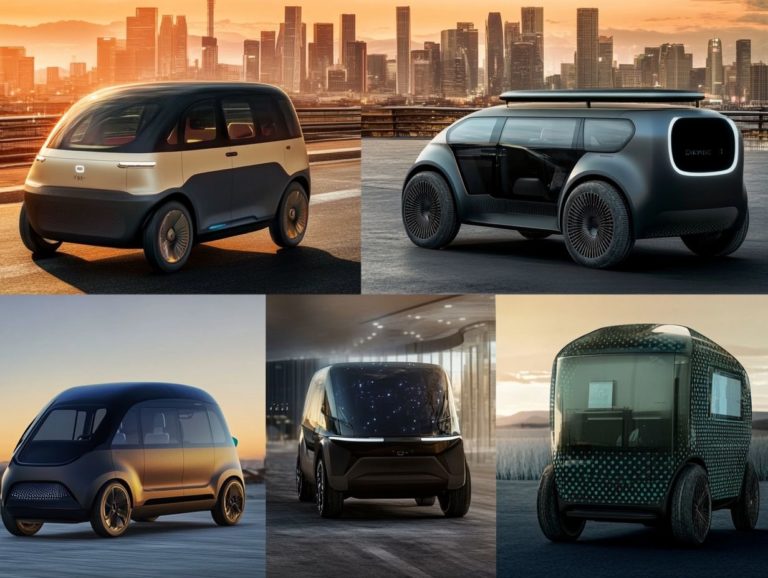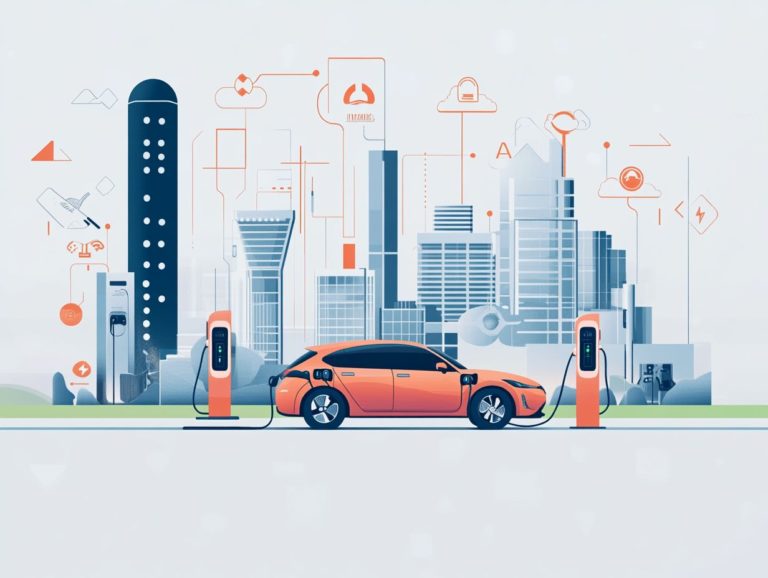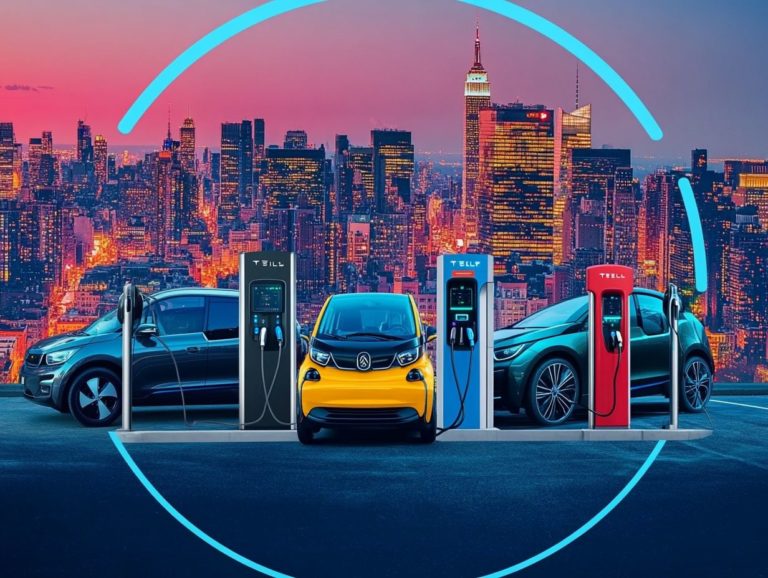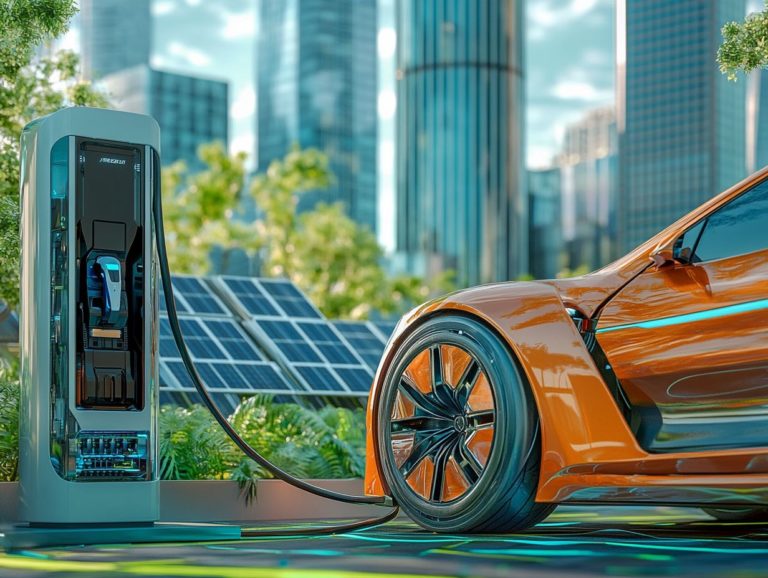The Latest Advances in EV Battery Technology
Electric vehicles (EVs) are changing the car industry, with battery technology at the center of this transformation.
The evolution of EV batteries has been crucial in shaping the industry’s future. Let s dive into the exciting world of EV batteries, examining various types, their advantages, and limitations, while showcasing recent breakthroughs that promise to enhance performance and extend range.
You ll uncover upcoming trends and their potential impact on both the EV market and the environment. Discover what lies ahead!
Contents
- Key Takeaways:
- Overview of EV Battery Technology
- Current State of EV Batteries
- Recent Breakthroughs in EV Battery Technology
- Future of EV Battery Technology
- Frequently Asked Questions
- What are the latest advances in EV battery technology?
- How has energy density improved in EV batteries?
- Are there any improvements in charging speeds for EV batteries?
- What advancements have been made in increasing the lifespan of EV batteries?
- How do EV batteries compare to traditional gasoline engines in terms of performance?
- What impact do advancements in EV battery technology have on the environment?
Key Takeaways:
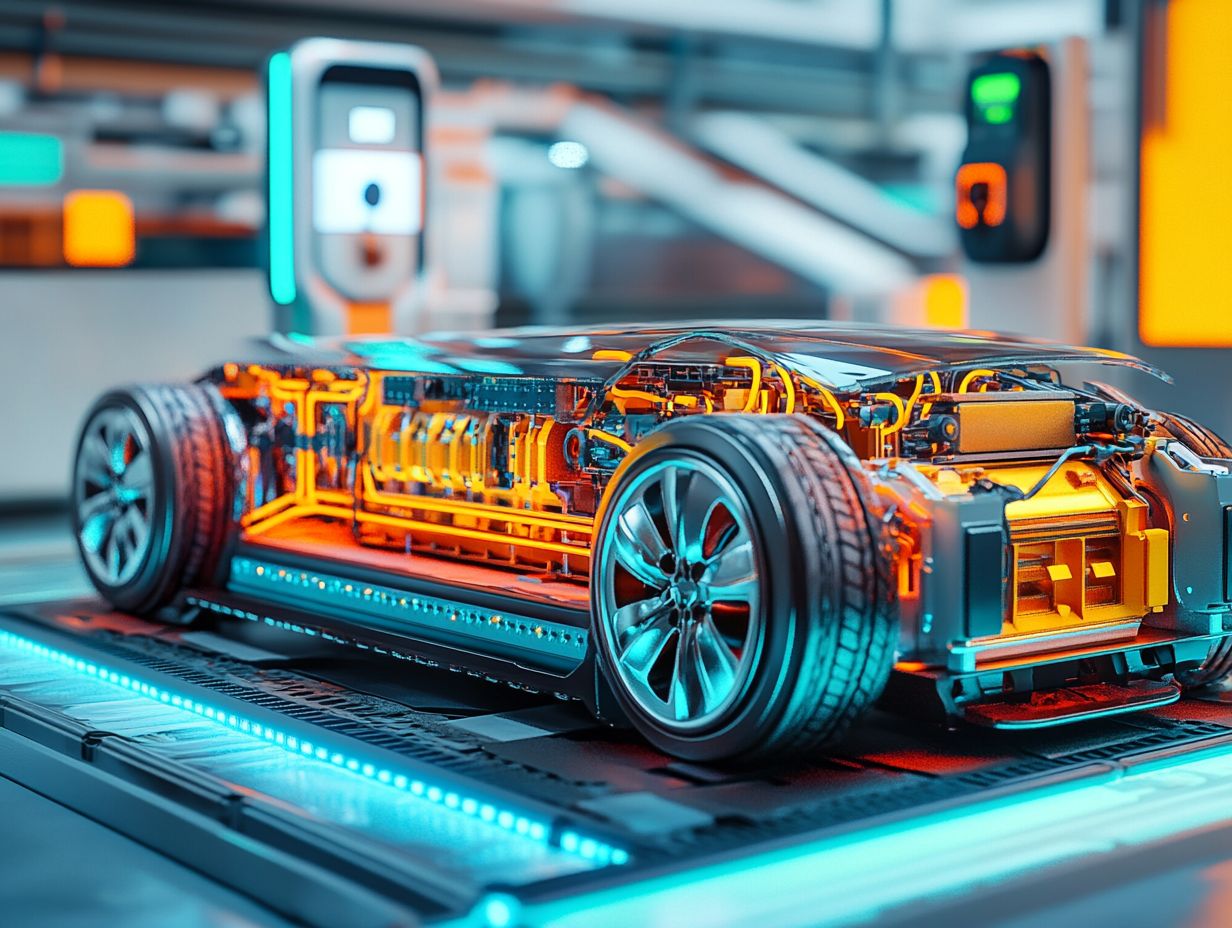
- The latest EV battery technology significantly improves performance and range, making electric vehicles a more viable option for consumers.
- New materials like solid-state batteries enhance efficiency and safety.
- Future innovations will make electric vehicles even more sustainable and cost-effective.
Overview of EV Battery Technology
Electric vehicle (EV) battery technology has seen impressive changes over the last decade, moving from conventional lithium-ion batteries to groundbreaking alternatives like solid-state and sodium-ion batteries. Understanding the role of battery technology in EV sustainability is crucial to appreciating these advancements.
This shift is fueled by the growing demand for sustainable transportation solutions, significant breakthroughs in battery chemistry, and the pursuit of greater energy density how much energy a battery can store in a small space and faster charging capabilities.
Influential players such as Rivian, Tesla, and Ford, along with initiatives from the US Department of Energy, are actively shaping the future of electric vehicles by prioritizing cost improvements and pioneering battery technologies.
History and Evolution
The history of EV battery technology features remarkable milestones, beginning in the 1990s with the advent of lithium-ion batteries. This breakthrough revolutionized energy storage for electric vehicles, marking a significant departure from conventional lead-acid batteries that were limited by energy density and lifecycle.
Pioneering companies like Sony played a pivotal role in this transformation, placing lithium-ion technology at the industry’s forefront. As electric vehicles surged in popularity, advancements continued, leading to the emergence of solid-state batteries that promise even greater energy density and enhanced safety.
At the same time, innovations in sodium-ion batteries have started gaining traction as a more sustainable and cost-effective alternative. Throughout this journey, influential figures like Elon Musk have propelled the industry forward, championing research and development that strategically shapes the future of electric mobility.
Current State of EV Batteries
In today s rapidly evolving landscape of EV batteries, lithium-ion technology reigns supreme. Be on the lookout for solid-state and sodium-ion batteries, which are emerging as formidable contenders, promising not only improved performance but also heightened safety for electric vehicles.
Stay tuned for more updates on EV technology!
Types of Batteries Used in EVs
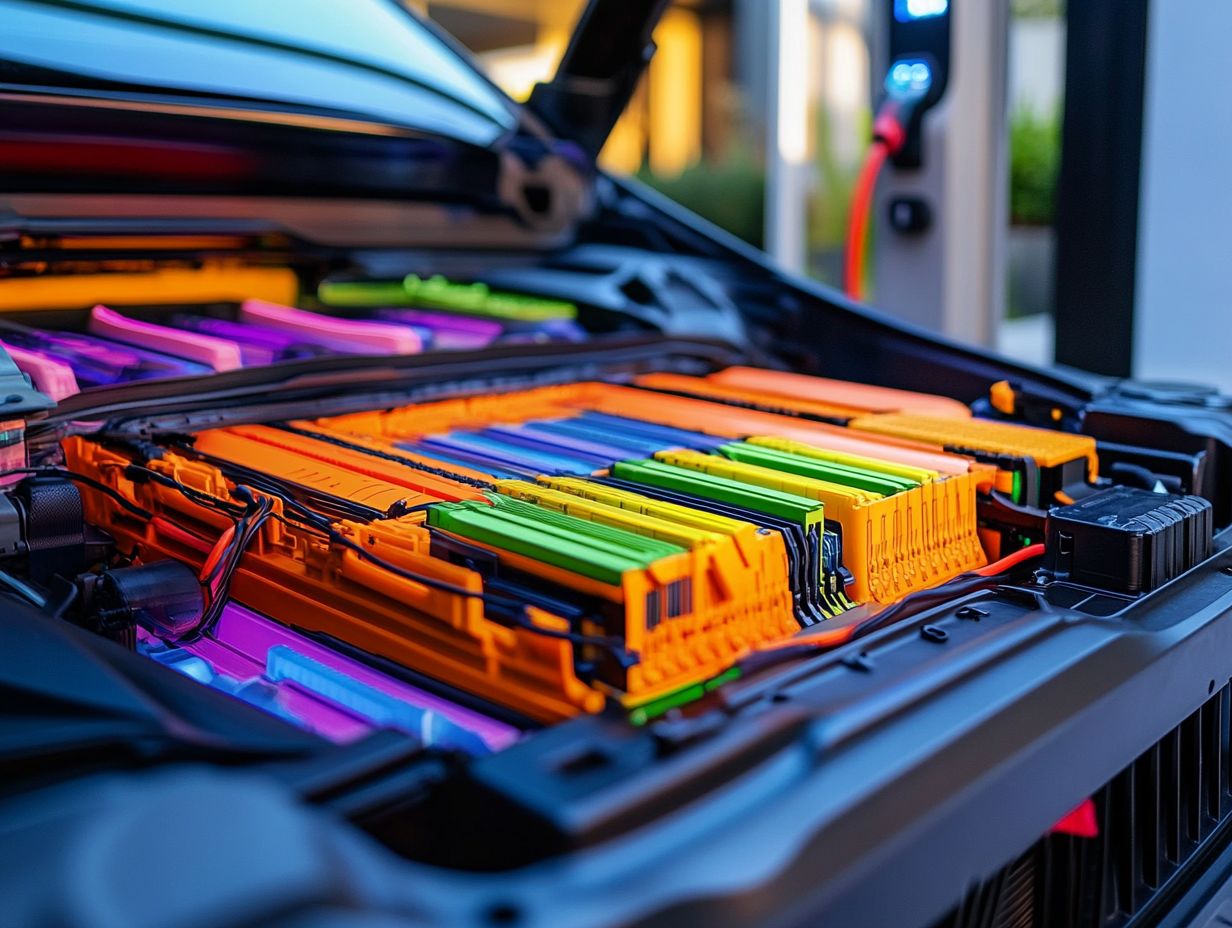
The primary types of batteries you ll encounter in electric vehicles today include lithium-ion, solid-state, and sodium-ion batteries. Each type brings unique advantages tailored to various EVs.
Lithium-ion batteries are the most common choice for everything from compact cars to high-performance models, blending efficiency and versatility thanks to their high energy density and reliable technology.
Solid-state batteries can address many of these concerns by delivering enhanced safety and even greater energy densities. Their promise paves the way for groundbreaking advancements in EV design.
Sodium-ion batteries present a cost-effective alternative, leveraging abundant materials for more sustainable solutions perfect for budget-conscious scenarios.
Both NMC (Nickel Manganese Cobalt) and LFP (Lithium Iron Phosphate) technologies are vital for enhancing overall battery performance and safety. They contribute significantly to improvements in energy efficiency, longevity, and thermal stability, ensuring you get the most out of your electric vehicle experience.
Advantages and Limitations
EV battery technology offers a variety of advantages, including higher energy density and improved charging speeds. However, it also grapples with challenges related to cost and long-term sustainability.
These factors greatly affect how practical electric vehicles are today. While the appeal of longer driving ranges due to higher energy density is significant, the financial burden of current manufacturing processes cannot be ignored.
Solid-state batteries hold the potential to quickly enhance enhanced safety and faster charging times, possibly eclipsing traditional lithium-ion technologies. Meanwhile, sodium-ion batteries present an intriguing alternative, potentially offering lower production costs and environmental benefits, enriching the battery landscape.
As these technologies continue to evolve, their influence on the EV sector could transform consumer perceptions and market dynamics, paving the way for broader adoption.
Recent Breakthroughs in EV Battery Technology
Recent breakthroughs in EV battery technology have introduced innovative solutions like solid-state and sodium-ion batteries. For more insights, check out the latest on EV charging technology. These advancements have the potential to significantly enhance energy density and charging speed, all while reducing costs in the electric vehicle market.
Embracing these technologies positions you at the forefront of the evolving landscape of sustainable transportation.
New Materials and Designs
The development of new materials and designs in battery technology, particularly advancements in solid-state and sodium-ion batteries, is transforming the future of energy storage for electric vehicles.
These innovations don t just promise to enhance battery performance; they also significantly improve safety and efficiency, tackling some long-standing challenges in the industry.
By harnessing advanced chemistries such as NMC (Nickel Manganese Cobalt) and LFP (Lithium Iron Phosphate), manufacturers can now create batteries that are not only more energy-dense but also remarkably stable. This provides longer life cycles and minimizes the risk of overheating.
These advancements lead to faster charging times and contribute to more sustainable production processes, making electric vehicles increasingly accessible and appealing to a wider audience. This shift is vital for a greener future.
Improvements in Performance and Range
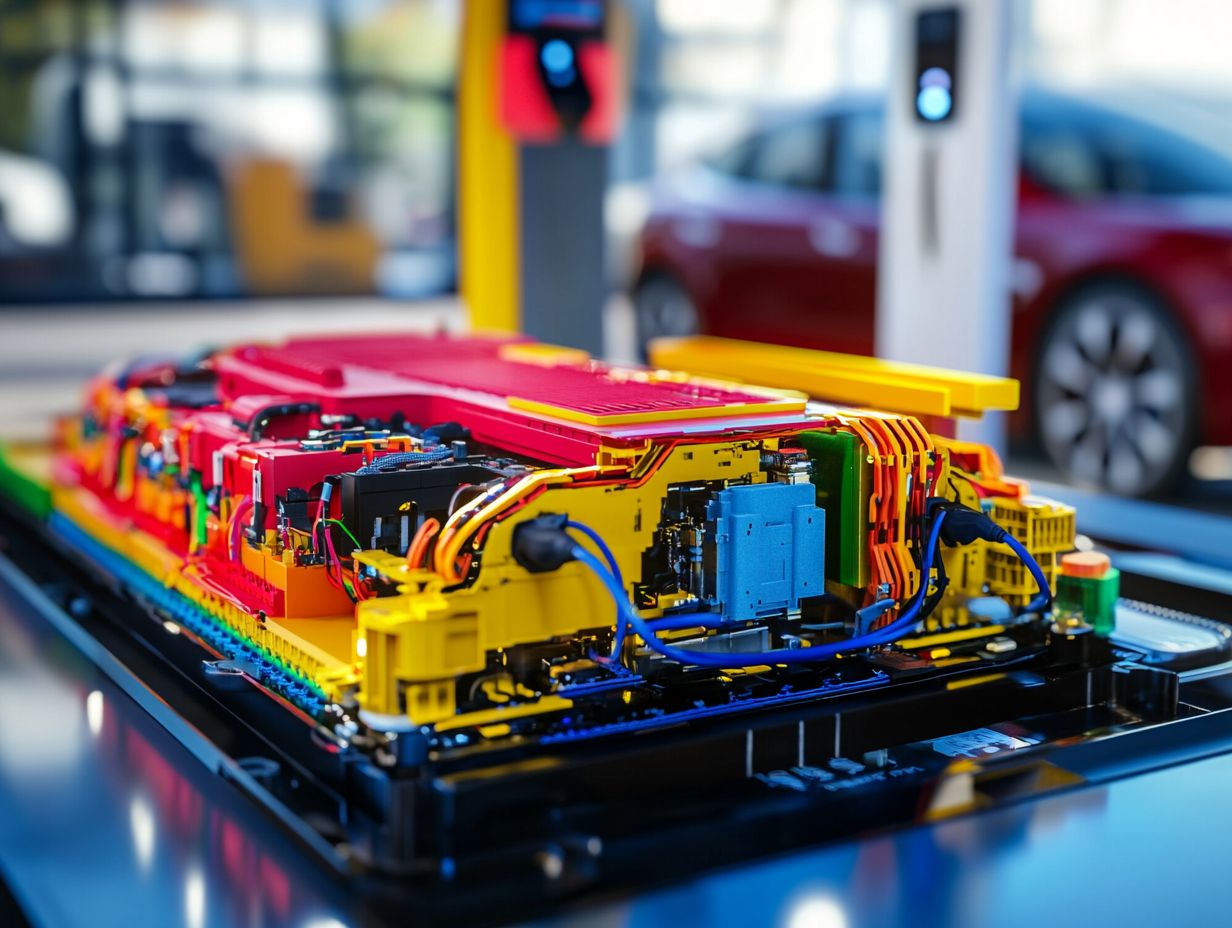
Improvements in performance and range are vital for the evolution of electric vehicles. Advancements in solid-state and sodium-ion batteries play a key role in enhancing your overall driving experience.
These cutting-edge battery technologies not only allow your vehicle to travel further on a single charge but also significantly reduce charging times. This addresses one of the biggest concerns for potential electric vehicle owners.
Solid-state batteries use a solid electrolyte, minimizing the risk of overheating and extending battery lifespan. This means you can depend on your vehicle for daily use.
Sodium-ion batteries also provide a more sustainable alternative, making electric mobility even more accessible for everyone.
These innovations are transforming the electric vehicle market. They promise a future where longer trips and quicker recharges are the norm, attracting a broader audience.
Future of EV Battery Technology
The future of EV battery technology is about to change dramatically. Groundbreaking advancements in solid-state and sodium-ion batteries will reshape electric vehicles and significantly improve sustainability efforts.
Upcoming Innovations and Trends
Innovations in EV battery technology point to a future where solid-state and sodium-ion batteries take the lead, enhancing both energy storage and charging speed. For more insights on this evolution, check out what to expect from EV technology advances.
These advancements aim to tackle critical challenges like battery life and environmental sustainability. As manufacturers move away from traditional lithium-ion batteries, solid-state batteries offer safety by using a solid electrolyte instead of a liquid one, reducing overheating risks.
Sodium-ion technology utilizes abundant materials and could emerge as a cost-effective alternative without sacrificing performance. Together, these breakthroughs could change your expectations as a consumer, leading to longer driving ranges and quicker refueling times.
This progress makes electric vehicles more accessible and widely adopted.
Impact on the EV Industry and Environment
How new battery technology is changing the EV industry and the environment is nothing short of transformative. Solid-state and sodium-ion batteries promise enhanced sustainability and reduced ecological footprints.
With these innovative battery solutions gaining traction, you’ll see improvements not just in vehicle efficiency and range, but also in the reduction of harmful emissions during production and recycling. Lighter, more energy-dense batteries allow manufacturers to create cleaner-running vehicles.
This commitment to greener practices is prompting automakers to invest in cleaner sourcing of raw materials and renewable energy for production.
- Reducing greenhouse gases
- Fostering automotive innovation
- Enhancing ecological stewardship
Frequently Asked Questions
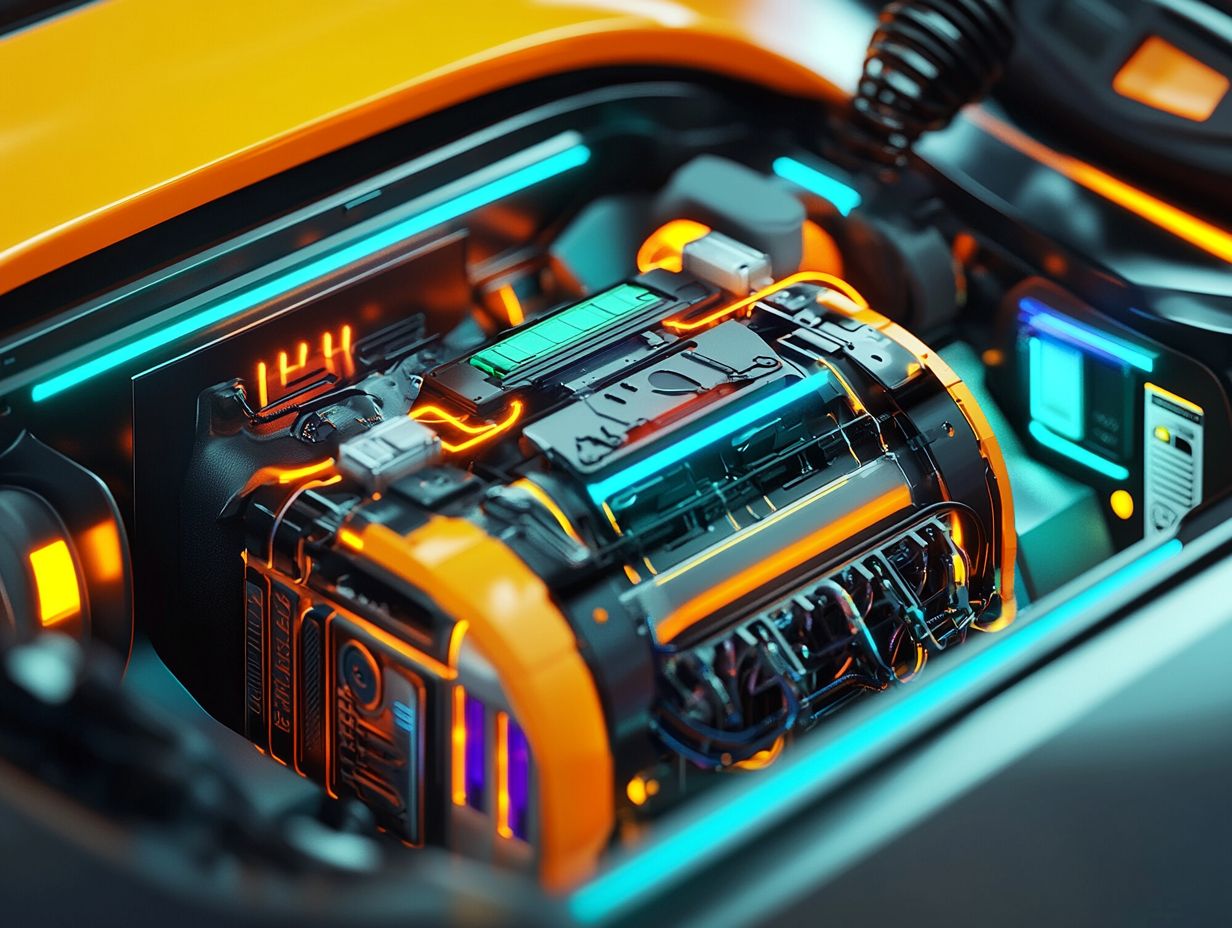
What are the latest advances in EV battery technology?
The latest advances in electric vehicles include increased energy storage, improved charging speeds, and longer battery life.
How has energy density improved in EV batteries?
Energy storage has improved thanks to better materials and designs, allowing for more efficient use of space in the battery.
Are there any improvements in charging speeds for EV batteries?
Yes! Some models can now charge to 80% in just 30 minutes, marking a significant improvement.
What advancements have been made in increasing the lifespan of EV batteries?
New battery technologies and cooling systems help EV batteries last longer. This means fewer replacements are needed, saving time and money.
How do EV batteries compare to traditional gasoline engines in terms of performance?
Today s EV batteries can match or even exceed the performance of gasoline engines. With quicker acceleration and smoother driving, they offer an exciting experience.
What impact do advancements in EV battery technology have on the environment?
Recent improvements in EV battery technology benefit the environment. They lower fossil fuel dependence and significantly reduce transportation emissions.



